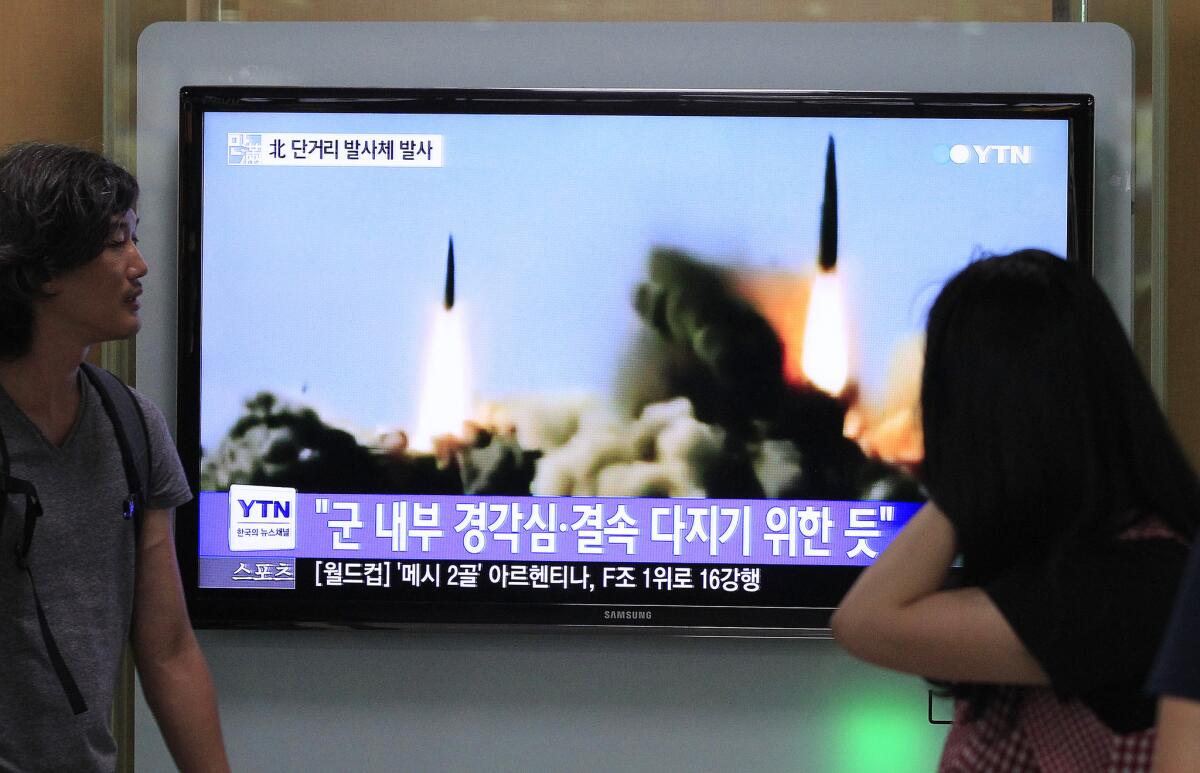North Korea fires 3 short-range projectiles into sea

- Share via
Reporting from Seoul — North Korea fired three short-range projectiles off of its east coast on Thursday, South Korea’s Joint Chiefs of Staff said.
The South Korean military said the projectiles were launched at around 5 p.m. local time and landed in international waters about 120 miles off the coast without causing noticeable harm. An unnamed South Korean official told the Yonhap News Agency that the military was looking into exactly what kind of missiles or rockets they were.
North Korea sporadically conducts test launches off its east coast, often from the port city of Wonsan. The last previous test took place in March, when the reclusive nation fired off a series of medium-range missiles. Such operations violate U.N. Security Council resolutions banning any ballistic missile or nuclear activity by North Korea.
The launches in March were carried out during joint military exercises between South Korea and the U.S., a recurring event that typically raises inter-Korean tensions. Though Seoul and Washington say those exercises are defensive in nature, North Korea objects to them, describing them as rehearsal for invasion of its territory.
Thursday’s launches came amid a minor sign of inter-Korean rapprochement: Officials from South and North on Thursday held their first meeting in six months in the North Korean border city of Kaesong to discuss further developing the jointly operated industrial complex in that city. The venture was closed for several months last year by North Korea, after it claimed the South Korean government had offended its dignity.
One hundred and twenty South Korean companies operate in Kaesong, producing a range of labor-intensive goods, mostly shoes and garments. About 53,000 North Koreans were employed there when the complex was at full operation before last year’s closure.
Since reopening, the total number of employees reporting for work is believed to have dropped.
The factory complex opened in 2002 as an important symbol of inter-Korean cooperation and has operated fairly consistently in recent years, despite interruptions and cancellations of other forms of cross-border exchange.
This week has also been a time of moderate political turmoil in South Korea. On Thursday, the government announced that Prime Minister Chung Hong-won would remain in his position, after two consecutive nominees to replace him bowed out due to controversies.
Chung had offered to resign in late April as a way of expressing contrition for sinking of the Sewol ferry, in which about 300 people died. Many of the victims were high school students on a field trip. The sinking caused a nationwide outpouring of sadness and anger over the government’s slow response.
Early this week, former journalist Moon Chang-keuk withdrew himself from consideration as Chung’s successor after public uproar over comments he made in the past stating that Japan’s 1910-1945 occupation of Korea was “God’s will.” In South Korea, the era remains a sensitive topic, and “pro-Japanese” is a potent slur in the nation’s political realm.
Before Moon, nominee Ahn Dae-hee stepped aside in late May after questions were raised about large sums of money he had earned as a lawyer shortly after retiring as a Supreme Court justice.
Borowiec is a special correspondent.
More to Read
Sign up for Essential California
The most important California stories and recommendations in your inbox every morning.
You may occasionally receive promotional content from the Los Angeles Times.








